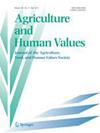Much research about organic foods standards and certification in the United States employs a critical political economic perspective to interrogate links between certification politics and the “conventionalization” of organic agriculture. While helpful, this literature tends towards a dualistic framework, which emphasizes conflicts between movement-oriented and agribusiness wings of the organic community but obscures deliberative processes that sustain the organic market as an alternative economic space. This article develops a different approach by taking up E. Melanie DuPuis and Sean Gillon’s invitation to “begin a conversation about the everyday forms of civic engagement” involved in the governance of the organic foods market and other alternative economies (DuPuis and Gillon in Agric Hum Values 26:43, 2009). I merge DuPuis and Gillon’s analysis of civic “modes of governance” in the organic sector with a theory of deliberative discourse developed by the cultural sociologist Jeffrey Alexander. I then apply this approach to examine a 2017 dispute about whether hydroponic growing operations were eligible for certification under the National Organic Program rules. The data indicate that (1) several features of this dispute did not follow the lines of movement/agribusiness conflict emphasized by political economic research and (2) both supporters and opponents of hydroponic certification drew from a common discursive repertoire to advocate for their preferred outcomes. I argue that while this common repertoire does not prevent conflict over the organic standards, it does sustain the importance of civic—as opposed to purely economic or technical—considerations in the sector’s governance.


